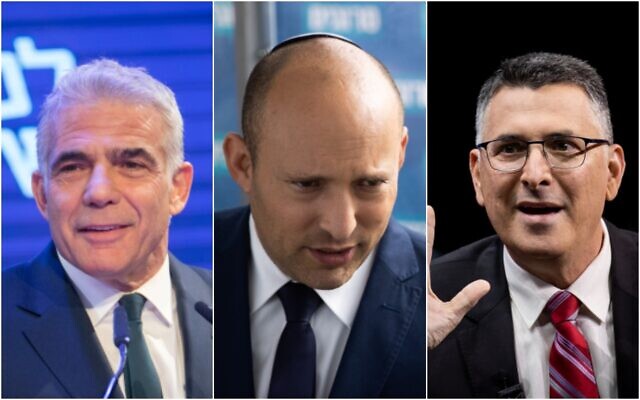Leaders of the Islamist Ra’am party, seen as a potential kingmaker in the wake of the March 23 election, were meeting Saturday in Nazareth to decide whom they will recommend the president task with forming a government, Channel 12 news reported.
Party leader Mansour Abbas was meeting the party’s consultative council to make a decision, the report said.
Ra’am and the other parties elected to the Knesset will meet with President Reuven Rivlin on Monday to give their recommendations for prime minister. Rivlin is expected to announce on Wednesday which candidate will be given the mandate to attempt to form a government.
With the election results continuing the political deadlock of past elections over the last two years, it seems that neither the bloc that supports Prime Minister Benjamin Netanyahu nor the bloc that opposes him will be able to form a government without the support of Abbas, whose Islamist party won four seats and will be the smallest faction in parliament.

Ra’am party leader Mansour Abbas at the party headquarters in Tamra, on election night, March 23, 2021. (Flash90)
Though he has expressed willingness to partner with either Netanyahu or his rivals — whichever offered a better deal benefiting Arab Israelis — he has yet to endorse a candidate.
Ra’am could possibly put either Netanyahu or his opponents over the 61-seat mark, crowning the next premier. But right-wing politicians in both blocs have ruled out basing a coalition on the party’s support, due to what they say is an anti-Zionist stance; others have accused Ra’am of supporting terrorists.
On Thursday Abbas gave a primetime speech in which he called for Arab-Jewish cooperation in Israel and urged Jewish parties not to boycott his conservative Islamist party.
But Religious Zionism party leader MK Bezalel Smotrich, who is a key member of Netanyahu’s alliance, said Friday that his party will not sit in a government that is dependent on any support from Ra’am.
Even if he does gain Ra’am’s support, Netanyahu also needs the backing of the similarly unaligned hard-right Yamina party, which is also unlikely to agree to partner with Ra’am.

Prime Minister Benjamin Netanyahu arrives to address supporters after the March 23 elections, at his Likud party’s election HQ in Jerusalem, early on Wednesday, March. 24, 2021. (AP Photo/Ariel Schalit)
Netanyahu has 52 lawmakers behind him, nine short of the 61 needed for a majority. Bennett’s 7-seat Yamina could lift him to 59.
Bennett met with Netanyahu Friday to hold negotiations on possibly forming a coalition government, in their first sit-down since last week’s inconclusive elections.
Bennett will meet Yesh Atid leader Yair Lapid on Saturday night, for the same purpose, Yamina said in a statement Thursday.
Following the elections, Bennett has been demanding that he become prime minister in a power-sharing deal with either Lapid or Netanyahu, despite his party only having seven Knesset seats. Netanyahu’s Likud won the most seats in the elections, 30, while Yesh Atid is the second-largest party with 17.
Lapid met Thursday with leaders of the Joint List party, an alliance of predominantly Arab member parties. The Joint List leaders did not commit to giving him their support and reiterated that they will not consider recommending Lapid unless he receives 55 other MKs’ recommendations.

Left to right: Yesh Atid party leader Yair Lapid (Miriam Alster/Flash90); Yamina party chief Naftali Bennett; and New Hope party head Gideon Sa’ar (Yonatan Sindel/Flash90)
Hebrew media reported Thursday that while Bennett has not yet decided whom he will recommend to Rivlin, he has all but ruled out Lapid and likely will submit his own name, rather than back Netanyahu either.
Sa’ar, leader of the New Hope party which is also seeking to replace Netanyahu, is reportedly working to broker an alternate coalition that would see Bennett rotate the premiership with Lapid. However, the idea is said to be hampered by disputes over who should actually be tasked with forming the coalition, with both sides skeptical of the other’s commitment to follow through on the power-sharing agreement.
Before the election, both Sa’ar and Bennett said they want to see Netanyahu removed from power, but also vowed not to let Lapid be prime minister.
Lapid has already met with Abbas seeking his support to become prime minister.
During Abbas’s speech, which was carried live by all of Israel’s major television networks, he did not endorse either Netanyahu or Lapid as the next premier, following last week’s inconclusive election. He also declined to associate his party with either political bloc.
Ra’am previously ran for the Knesset as part of the Joint List but broke off ahead of last week’s vote for an independent run, amid disagreements over Abbas’s political willingness to back Netanyahu.
Related posts:
Views: 0
 RSS Feed
RSS Feed















 April 3rd, 2021
April 3rd, 2021  FAKE NEWS for the Zionist agenda
FAKE NEWS for the Zionist agenda  Posted in
Posted in  Tags:
Tags: 
















